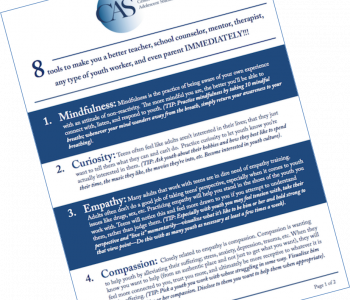

Catharine Hannay, MA
Catharine Hannay is the founder of MindfulTeachers.org and the author of Being You: A Girl’s Guide to Mindfulness, a workbook for teen girls on mindfulness, compassion, and self-acceptance.
What Can I Do If a Youth Asks Me for Personal Information?
When one of my friends asked his therapist if she’d ever experienced the challenge he was facing, she said:
“You want me to self-reveal?!”
My friend told me:
“It felt really creepy. I just wanted to know if she understood what I was going through, and she acted like I wanted her to take all her clothes off.”
It was entirely appropriate for the therapist to set a boundary around discussing her personal life with one of her clients. But there are two problems with the way she set that boundary:
- She got flustered and overreacted to a question that wasn’t intended to be at all offensive; and
- She blurted out a reaction that didn’t make any sense to the client, who’d never heard the term ‘self-reveal.’
It would have been much more skillful for her to say something like: “We’re here to focus on you, so I’d prefer not to talk about my own life.” Or, better yet, “Why do you ask?”
There are several different reasons why your clients (or students, patients, etc.) might be interested in learning more about you.
- They might be trying to deflect attention away from discussing their own experience, especially if it was embarrassing or traumatic.
- They might use the information to try to manipulate you in some way. This isn’t common, but unfortunately it does happen sometimes.
- They might be confused about your role and think of you as their buddy. (This is obviously more likely if you’re a camp counselor or youth pastor as opposed to a parole officer.)
- They might be from a culture with different rules about appropriate and inappropriate questions. For example, in some countries it’s common to ask adults how old they are, whereas many people in the US would prefer not to share that information.
- Or, like my friend, they might simply want to know if you’ve ever been in a similar situation to theirs, because they want to know if you understand their challenges.
In What Works with Teens, Baron and Rathbone note that it’s common for adolescents to “cross the line by asking personal questions that feel off-limits to us.”
“It gets complicated when we are not practiced at stating our limits and needs clearly, as missteps can lead to resentment and anger […] They rely on us as helping adults to teach them what is and what isn’t appropriate for a given situation.” (p. 87)
Here are a couple of examples of how to draw a line effectively and compassionately, so you can maintain an appropriate level of distance without alienating the youth in your care.
Situation #1: What if Their Feelings Get Hurt?
Kendra, a popular young tutor, is feeling uncomfortable because a student tried to ‘friend’ her on social media and is upset that she didn’t accept the request.
Here’s one way Kendra could explain the situation to her student:
“I know our [tutoring] relationship has a lot in common with a friendship, but it’s actually a little different. I will be here for your during our meetings, and I really enjoy my relationship with you. At the same time, I’d prefer to keep my Facebook private. I hope you understand, and I welcome any questions you have about this.” (Baron and Rathbone, What Works with Teens, p. 87)
We all have different boundaries around social media. You might not have any trouble ‘friending’ the young people you work with, or you might choose not to use social media at all. What’s important is to be clear and consistent in setting your own boundaries around this. For example, it would be unfair to ‘friend’ some students but not others.
Another important point to notice about this example: She doesn’t just say ‘no’ and leave it at that. Her student has the opportunity to react and ask questions about Kendra’s policy.
Situation #2: What If They Keep Pushing Back?
Dr. Sam Himelstein had a client at a juvenile detention center who kept pushing for intimate details about his personal life.
Shawn: “Aw, what the? You want me to share all my stuff but you don’t want to share yours?” […]
Dr. Himelstein: “I really just don’t feel comfortable sharing that with you, Shawn, and I hope you can respect that.”
[… Shawn keeps on pushing for inappropriate personal details…]
“Shawn, I’m feeling like you’re challenging me right now, is that true? […] I told you that I wasn’t going to tell you what you were asking about, but you kept on prying.”
After pausing for about twenty seconds for this to sink in, Shawn said:
“Yeah I guess I’m just used to punkin’ [challenging] people into getting what I want.”
By remaining calm and firm, Dr. Himelstein not only asserted the appropriate boundaries of the therapeutic relationship, he also helped Shawn develop insight into his typical patterns of behavior.
(from A Mindfulness-Based Approach to Working with High-Risk Adolescents, p. 38)
Conclusion
There may be clear policies and ethical guidelines in your field or institution about what types of information are inappropriate to share with the youth in your care. If not, it would be a good idea to clarify this with your supervisor and colleagues before a problem arises. You can avoid a lot of potential frustration and awkwardness if you think through likely scenarios ahead of time.
Here are a few questions to consider:
- What types of topics are completely off-limits for me to discuss with my clients/patients/students?
- What information might I feel comfortable sharing under certain circumstances, or in a limited way?
- How can I respond if I’m asked about a topic that’s off limits for me?
- What are some other ways I might need to set a boundary with youth? (perhaps relating to socializing or social media, or when you are/aren’t available)
- How can I remain calm and compassionate while setting a limit?
- How can I respond if someone doesn’t take ‘no’ for an answer and keeps pushing me?
The point of setting and maintaining boundaries isn’t just to protect the adult (although that can certainly be important). It’s also to teach youth what is and isn’t appropriate, and to model for them how to firmly and compassionately set a limit when their own boundaries are crossed.
You’ll find more tips on skillful self-disclosure and setting boundaries with youth in the following posts:

